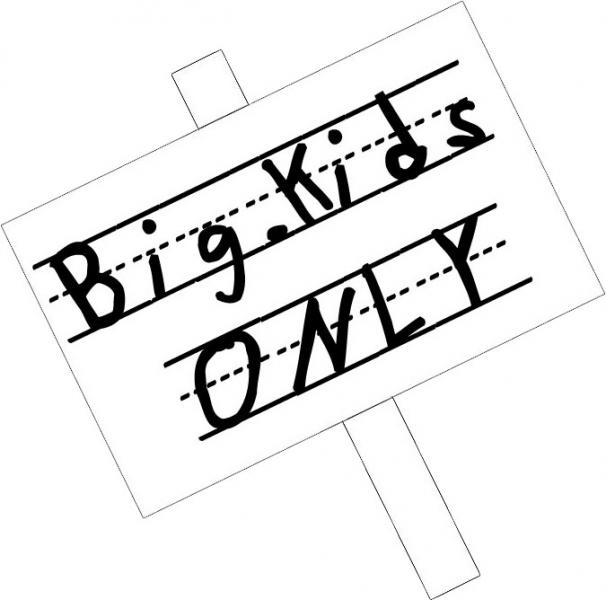Silly 24-Year-Olds, School Is for Kids

It was Orientation Week.
I sat among my future cohorts for the next two years of graduate school. Pen in hand, university brochures stacked on the table, bag of swag against my leg. I listened closely.
- "The kids who come out of this school are movers and shakers in the real world."
Kids? What kids? Maybe they're talking about the campus daycare.
- "We send our kids all over the world to give them an invaluable international experience."
- "Some kids do really well with the course load, but it can be challenging for others."
I glanced around the room of mostly 20-something students each time we or previous classes were referred to as "kids." No one looked back. Maybe they were used to it. Or maybe they just didn't care.
I care.
It goes without saying that condescending behavior exists in academia. It's fitting for a culture in which intellect and pedagogy are central. A bit of pomp can give you that cerebral edge.
However, I firmly believe that patronizing communication is un-educational. I care deeply about higher education, so this issue burns me like wasabi in a windpipe.
The Problem:
Many college instructors and academic staff refer to college students as “kids.” They do it with gusto. They do it with fondness. They do it out of good cheer, oftentimes. But regardless of intent, this practice is subtly degrading, discreetly embarrassing and unfair.
And when the "kids" grow up and begin teaching/TAing/grading papers of their own, some begin to proudly refer to their near peers as “my kids.” They do it with gusto, fondness and out of good cheer.
I think many academics genuinely view college freshmen (especially) as children. But perhaps 18-, 19- and 20-somethings act immature because they've been treated like children their whole lives. Thumbsuckers or not, they're old enough to have a mortgage.
So what justification does academia have to perpetuate the trend? What does anyone gain? Isn't higher education supposed to foster symbiotic respect?
Most professors proudly cling to the notion that they, too, learn from their students. That their students aren't afraid to disagree in class. That they don't treat them like kids.
To be transparent, my observation of the 20-something "kids" phenomenon has been primarily within the college forensics (speech & debate) circuit. Coaches often refer to their competitors as lowly children they have to babysit. Perhaps college sports teams operate in a similar fashion.
However, in the first few weeks of my new graduate program--new school, new superiors, new atmosphere--I observed the same lingo, repeatedly. And because I was back in a student seat, I was, once again, one of the “kids.”
Kids who are in their 20s or 30s. Kids who work full-time to support themselves through school. Kids who have kids of their own. And even if their mom still does their laundry… kids who engage in a rigorous academic activity exclusive to adult students. We don't need our parents to sign a waiver for off-campus assignments.
Heard in the Hallways:
- “I assigned my kids a super tough research paper.”
- “My kids are struggling with the new material, but they’re a sharp bunch.”
- “How’re your kids doing? Mine are so cute. They're all stressed about this big project we assigned.”
These sentiments make me want to shove a pacifier into the speaker’s mouth to plug that patronizing hole.
(Exception: Shortly after one such “kids” comment, the professor noted that this was an accidental, inappropriate mistake. She laughed at the gaff and suggested that it was due to a near 30-year age gap between her and the average college student. I respected her earnest, open and funny acknowledgement of the mistake. We all chuckled with gusto, fondness and good cheer.)
So. Rather than exhaustively explain why condescending behavior damages an open, mutually beneficial educational environment, I’ll just put in my two cents. Readers will make their own conclusions. (Unless they're kids, because then we'll just tell them what to think.)
Cent #1. Referring to college students as kids sets the bar very low. When you treat subordinates like guileless juveniles, they are more likely to operate within that context. Don’t be surprised when they whine. Those who display maturity should not be viewed as exceptional. They’re just acting like the adults they are.
Cent #2. It’s a cycle. Students who hear themselves referred to as “kids” are more likely to repeat the trend when and if they acquire a position of collegiate power.
It broke my heart a little the first time I heard former-classmates-now-instructors refer to their new batch of undergrads as “my kids.” The more endearingly they said it, the more sweetly I wanted to punch them in the face.
This trend will likely continue, and it’s not like name-calling back is gonna help, any. What would I say? Geezer? Pedant? Hubristic sophist!
But hopefully these two cents find themselves in an academic conversation, somewhere.
Because if discourse doesn't count as currency in academia, then what does?
Reach columnist Lisa Rau here
Follow her on Twitter: @LisaRau
An earlier version of this article originally appeared on Square Syndrome.



